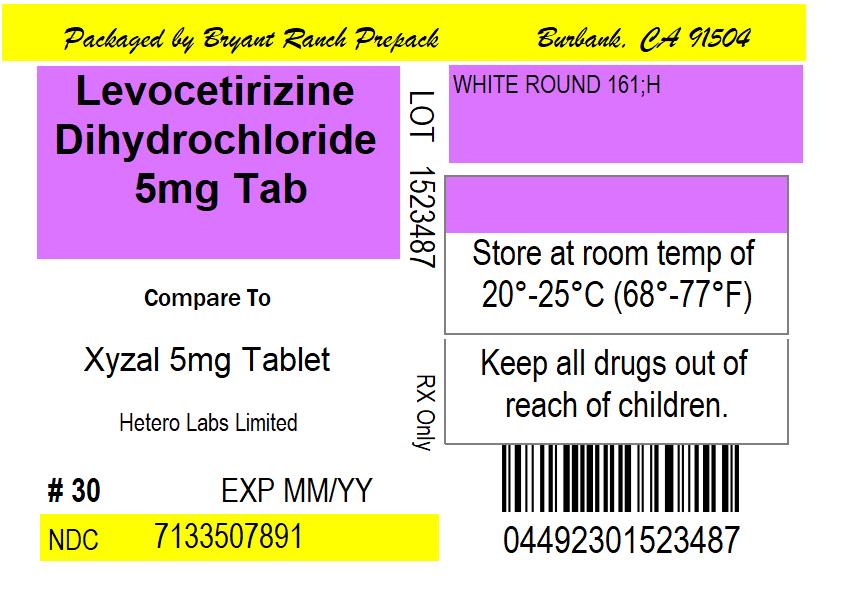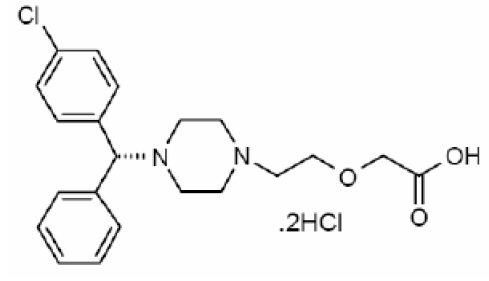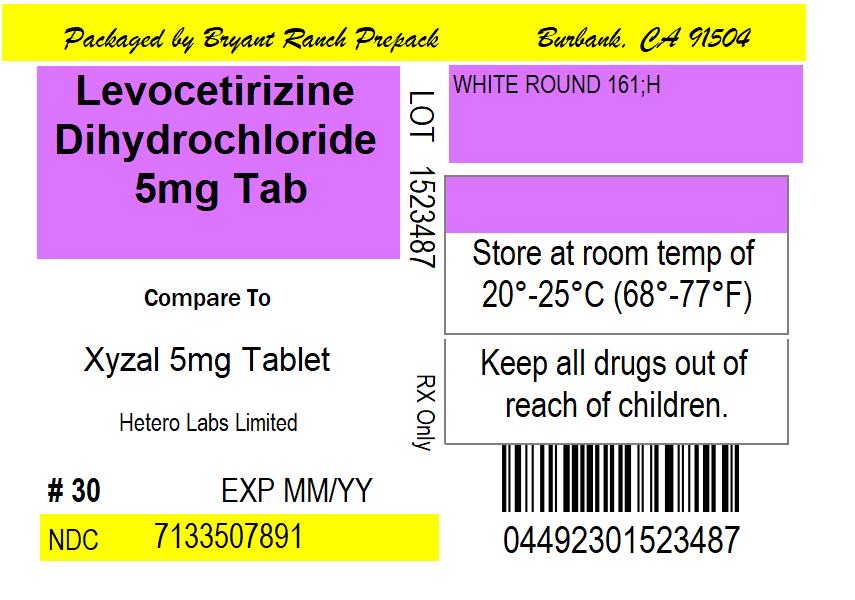Label: LEVOCETIRIZINE DIHYDROCHLORIDE tablet
- NDC Code(s): 71335-0789-1, 71335-0789-2, 71335-0789-3, 71335-0789-4
- Packager: Bryant Ranch Prepack
- This is a repackaged label.
- Source NDC Code(s): 31722-551
- Category: HUMAN PRESCRIPTION DRUG LABEL
- DEA Schedule: None
- Marketing Status: Abbreviated New Drug Application
Drug Label Information
Updated March 28, 2025
If you are a consumer or patient please visit this version.
- Download DRUG LABEL INFO: PDF XML
- Official Label (Printer Friendly)
-
HIGHLIGHTS OF PRESCRIBING INFORMATIONThese highlights do not include all the information needed to use LEVOCETIRIZINE DIHYDROCHLORIDE TABLETS safely and effectively. See full prescribing information for LEVOCETIRIZINE DIHYDROCHLORIDE ...
-
Table of ContentsTable of Contents
-
1 INDICATIONS & USAGE1.2 Chronic Idiopathic Urticaria - Levocetirizine dihydrochloride tablets are indicated for the treatment of the uncomplicated skin manifestations of chronic idiopathic urticaria in adults and ...
-
2 DOSAGE & ADMINISTRATIONLevocetirizine dihydrochloride tablets are available as 5 mg breakable (scored) tablets, allowing for the administration of 2.5 mg, if needed. Levocetirizine dihydrochloride tablets can be taken ...
-
3 DOSAGE FORMS & STRENGTHSLevocetirizine dihydrochloride tablets, USP are white film coated, scored, round, biconvex tablets, debossed with '161' on one side and 'H' on other side.
-
4 CONTRAINDICATIONSThe use of levocetirizine dihydrochloride tablets are contraindicated in: 4.1 Patients with Known Hypersensitivity - Patients with known hypersensitivity to levocetirizine or any of the ...
-
5 WARNINGS AND PRECAUTIONS5.1 Somnolence - In clinical trials the occurrence of somnolence, fatigue, and asthenia has been reported in some patients under therapy with levocetirizine dihydrochloride. Patients should be ...
-
6 ADVERSE REACTIONSUse of levocetirizine dihydrochloride has been associated with somnolence, fatigue, asthenia and urinary retention [see Warnings and Precautions (5)]. 6.1 Clinical Trials Experience - The ...
-
7 DRUG INTERACTIONSIn vitro data indicate that levocetirizine is unlikely to produce pharmacokinetic interactions through inhibition or induction of liver drug-metabolizing enzymes. No in vivo drug-drug ...
-
8 USE IN SPECIFIC POPULATIONS8.1 Pregnancy - Risk Summary - Available data from published literature and postmarketing experience with levocetirizine use in pregnant women are insufficient to identify any drug-associated ...
-
10 OVERDOSAGEOverdosage has been reported with levocetirizine dihydrochloride. Symptoms of overdose may include drowsiness in adults. In children agitation and restlessness may initially occur, followed ...
-
11 DESCRIPTIONLevocetirizine dihydrochloride, the active component of levocetirizine dihydrochloride tablets, USP is an orally active H1-receptor antagonist. The chemical name is (R)-[2-[4-[(4-chlorophenyl ...
-
12 CLINICAL PHARMACOLOGY12.1 Mechanism of Action - Levocetirizine, the active enantiomer of cetirizine, is an antihistamine; its principal effects are mediated via selective inhibition of H1 receptors. The ...
-
13 NONCLINICAL TOXICOLOGY13.1 Carcinogenesis, Mutagenesis, Impairment Of Fertility - No carcinogenicity studies have been performed with levocetirizine. However, evaluation of cetirizine carcinogenicity studies are ...
-
14 CLINICAL STUDIES14.1 Perennial Allergic Rhinitis - Adults and Adolescents 12 Years of Age and Older - The efficacy of levocetirizine dihydrochloride was evaluated in four randomized, placebo-controlled ...
-
16 HOW SUPPLIED/STORAGE AND HANDLINGLevocetirizine dihydrochloride tablets, USP 5 mg are white film coated, scored, round, biconvex tablets debossed with '161' on one side and 'H' on other side. NDC: 71335-0789-1: 30 Tablets in a ...
-
17 PATIENT COUNSELING INFORMATIONSomnolence - Caution patients against engaging in hazardous occupations requiring complete mental alertness, and motor coordination such as operating machinery or driving a motor vehicle after ...
-
PRINCIPAL DISPLAY PANELLevocetirizine Dihydrochloride 5mg Tab
-
INGREDIENTS AND APPEARANCEProduct Information




